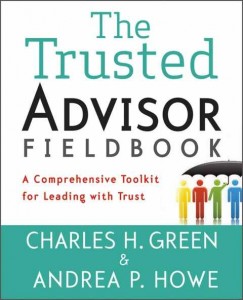 The countdown continues until “The Trusted Advisor Fieldbook: A Comprehensive Toolkit for Leading with Trust,” (from Wiley Books) hits shelves everywhere. As we eagerly await publication, my co-author, Andrea Howe, and I are posting a series of daily Trust Tips.
The countdown continues until “The Trusted Advisor Fieldbook: A Comprehensive Toolkit for Leading with Trust,” (from Wiley Books) hits shelves everywhere. As we eagerly await publication, my co-author, Andrea Howe, and I are posting a series of daily Trust Tips.
These brief yet insightful tips can be found on Twitter by using the hashtag #TrustTip. Or,if you prefer, you can go straight to the source by finding us on Twitter at @AndreaPHowe and @CharlesHGreen.
Not keen to leave those of you out who haven’t jumped onto the Twitter bandwagon, we keep a running tally of all the Trust Tips right here on our site.
We do recommend you take a second, or third, look at Twitter though. We’ve been having some great discussions over there about the tips and more. We’d love for you to chime in.
The Tips
The tips are published every workday as a means to give you a quick method to heighten your trustworthiness and build stronger work relationships.
If you need to catch up, see our recaps of Tips #144-135; #134-115; and #114-105.
Trust Tips #104-90
#104: “Trust but verify.” = blowing smoke. If you have to verify, it’s not trust.
#103: Acknowledge uncomfortable situations: try “I’m probably the only one wondering this, but…” You won’t be.
#102: Name and Claim the Elephant in the Room. Candor drives trust; it’s controlled risk taking.
#101: Don’t gossip or promote relationship “triangles.”
#100: Think it through: how will your client react to what you’re thinking of saying?
#99: Don’t think “I can’t trust yet, it’s too risky;” risk is what creates trust. Take the first risk.
#98: Possibly the best sales/client/relationship question is: Tell me more–please.
#97: Be the same person to all people at all times. That’s a good definition of integrity.
#96: Practice asking difficult questions or making difficult statements before you deliver them
#95: By being willing to have a Point of View, you help everyone else crystallize theirs
#94: Hold others accountable; letting others off the hook lets them live down to your expectations
#93: Write your next proposal with your client; sitting next to them; on the same side of the table
#92: Talk more with your eyes, ears & body, and less with your mouth
#91: Be empathetic: the benefit-to-cost ratio of empathy is nearly infinite.
#90: Next time something great happens, pin the credit on someone.
A Couple of My Favorites:
#93: The normal routine for writing proposals just reinforces the separation between ourselves and our clients (or customers, or partners). We say, “good meeting, I’ll get back to you with a . PDF document by Friday, and ship you hard copy as well.”
Instead, try saying, “Let’s book the conference room again this Friday, and write this proposal together, sitting on the same side of the table. We’ll each bring all our questions and data and we’ll make sure we come up between us with the best possible approached. Of course it’s still a proposal, I know we may not win–but it will be the best possible proposal the two of us can possibly produce.”
#90: We’re pretty good at pinning the blame on others. And we’re often quick to take credit. Taking responsibility is a good antidote to blaming, and ‘pinning the credit’ is the cure for hogging it all to ourselves.
Next time something good happens and you start maneuvering to look like it was your doing, stop–and pin the credit on someone else. They’ll appreciate it, and it’s a good way to practice lowering your self-orientation.
 Over the past few months we’ve counted down 144 daily #TrustTips on Twitter. Each tip aimed to help you improve your trustworthiness and trusted relationships within your professional and personal lives. We collected them all here.
Over the past few months we’ve counted down 144 daily #TrustTips on Twitter. Each tip aimed to help you improve your trustworthiness and trusted relationships within your professional and personal lives. We collected them all here.
 The countdown continues until “The Trusted Advisor Fieldbook: A Comprehensive Toolkit for Leading with Trust,” (from
The countdown continues until “The Trusted Advisor Fieldbook: A Comprehensive Toolkit for Leading with Trust,” (from  Last week
Last week  I am very proud to announce with my co-author
I am very proud to announce with my co-author